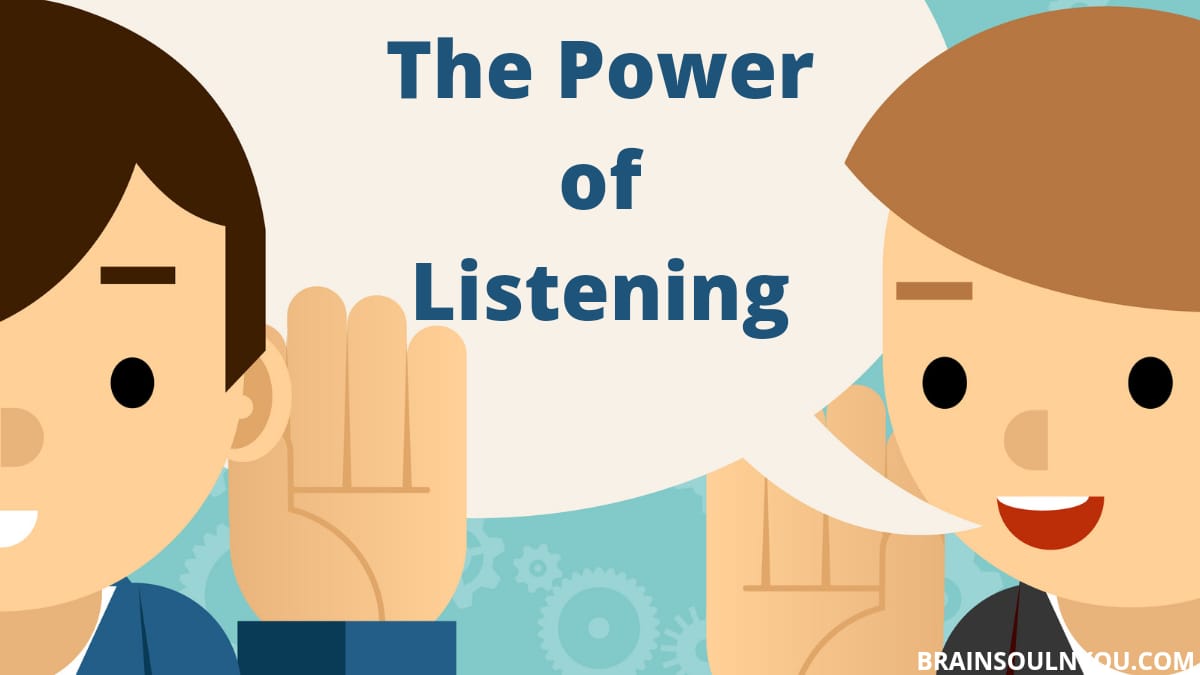The power of listening is immense and can have a transformative impact on individuals and relationships.
The power of listening lies in its ability to validate, connect, understand, and build relationships. It is a catalyst for personal growth, effective communication, conflict resolution, and fostering trust. By harnessing the power of listening, we can create positive change in our interactions, relationships, and the world around us.
Why the Power of Listening is Important?
Communication is the most important life skill. When we are awake, we spend most of our time in communication. We learn to speak. We learn to write and read. But no one teaches us to listen.
If you want someone to understand and be influenced by your words will have to listen to you. It is also important for you that to understand someone, listen to him first.

Listening is important for several reasons:
Understanding: Listening allows us to gain a deeper understanding of others. When we listen attentively, we can absorb information, perspectives, and experiences that may be different from our own. It helps us expand our knowledge, challenge our assumptions, and develop empathy and compassion towards others.
Effective Communication: Listening is the most important part of effective communication. It helps us receive and interpret messages accurately. When we actively listen, we can better understand what others are saying, respond appropriately, and engage in meaningful conversations. It fosters mutual understanding, prevents misunderstandings, and builds stronger connections with others.
Relationship Building: Listening plays a crucial role in building and maintaining relationships. When we genuinely listen to others, it conveys respect, validation, and care. It helps establish trust and rapport, as people feel heard and understood. Good listening skills contribute to healthy relationships, whether in personal, professional, or social contexts.
Problem Solving: Active listening is essential for problem-solving and conflict resolution. By attentively listening to different perspectives and viewpoints, we can identify common ground, find solutions, and reach compromises. It promotes collaborative problem-solving and fosters a sense of fairness and inclusivity.
Emotional Support: Listening is a powerful tool for providing emotional support to others. When we actively listen, we create a safe space for individuals to express their feelings, concerns, and challenges. It allows them to release emotions, gain clarity, and feel supported and validated in their experiences.
Learning and Growth: Listening promotes continuous learning and personal growth. By listening to others, we can gather insights, knowledge, and wisdom from different sources. It exposes us to diverse ideas, perspectives, and experiences, broadening our horizons and expanding our understanding of the world.
Conflict Resolution: Effective listening is crucial for resolving conflicts and improving communication in challenging situations. When we listen attentively and empathetically, we can understand the underlying needs, motivations, and emotions of others involved in a conflict. This understanding paves the way for constructive dialogue, empathy, and finding mutually agreeable solutions.
Leadership and Influence: Listening is a key attribute of effective leaders and influencers. Leaders who listen well create an environment that encourages open communication, trust, and collaboration. They make informed decisions, take into account diverse viewpoints, and empower others to contribute their ideas and perspectives.
Overall, listening is important because it enhances understanding, strengthens relationships, improves communication, fosters empathy, supports emotional well-being, promotes learning, and contributes to effective problem-solving. By honing our listening skills, we can enhance our interactions with others, deepen connections, and contribute positively to our personal and professional lives.
Empathic Listening
Often parents are taught that they do not even understand their children what want. The same thing remains between husband and wife. As I said above, you cannot understand anyone until you listen to him. Most of the people fill with their own rightness.
Empathic listening means listening to someone with the intent to understand. Empathic listening falls within the realm of another person’s context. You see through it, you see the world the way they see the world, you understand their paradigm, you understand how they feel.

Empathic listening is a type of listening that goes beyond simply hearing the words spoken by another person. It involves actively seeking to understand and connect with the speaker’s thoughts, feelings, and experiences on a deeper level. Empathic listening requires genuine empathy and a desire to understand the speaker’s perspective without judgment.
Here are some key characteristics and principles of empathic listening:
Presence: Empathic listening involves being fully present and engaged in the conversation. It requires setting aside distractions, giving your undivided attention, and showing genuine interest in the speaker.
Non-judgmental Attitude: Empathic listening requires suspending judgment and avoiding making assumptions about the speaker. It involves accepting the speaker’s thoughts and feelings as valid and important, regardless of whether you agree or disagree with them.
Active Listening: Empathic listening entails actively and attentively listening to the speaker. This includes making eye contact, nodding, using verbal and non-verbal cues to show understanding and encouragement, and reflecting back what the speaker has said to ensure accurate comprehension.
Empathy: In empathic listening, empathy is essential. It involves putting yourself in the speaker’s shoes, attempting to understand their emotions, and validating their experiences.
Reflective Responses: Empathic listening often involves responding to the speaker with reflective statements or questions. This means paraphrasing or summarizing what the speaker has said and reflecting it back to them to demonstrate understanding and to clarify any misunderstandings.
Validation: Empathic listening aims to validate the speaker’s emotions and experiences. It involves acknowledging the speaker’s feelings and demonstrating empathy and support. Validating the speaker’s experiences helps create a safe and trusting environment for open communication.
Emotional Awareness: Empathic listening requires attunement to the speaker’s emotions and emotional cues. It involves recognizing and acknowledging the speaker’s emotional state and responding with sensitivity and understanding.
Non-verbal Communication: Non-verbal cues, such as facial expressions, body language, and tone of voice, play an essential role in empathic listening. Paying attention to these cues can provide additional insight into the speaker’s emotions and help in building a deeper connection.
By practicing empathic listening, you can foster stronger relationships, enhance understanding, and provide emotional support to others. It creates an environment of trust and mutual respect, allowing individuals to feel heard, understood, and validated.
7 Principles of Better Listening
Better listening is a practice that involves fully engaging with the speaker and seeking to understand their message on a profound level. It goes beyond surface-level listening and requires focused attention and intention.
1. Eye Contact
Eye contact matters a lot during listening to someone. Making good eye contact, show that you are fully engaged and interested in what the speaker is saying. A good guideline to follow is the 80/20 rule in which 80% of the time your eyes are making eye contact with your speaking partner, and 20% of the time your eyes are wandering as you gather information to say.
2. Presence
Better listening requires being fully present in the moment and giving your complete attention to the speaker. It involves setting aside distractions, such as electronic devices or internal thoughts, and immersing yourself in the conversation. Being present allows you to tune in to the speaker’s words, tone, body language, and emotions.
An average person speaks 130 to 160 words per minute, but an average person’s brain works 400 to 600 words per minute. This means that your mind is moving much faster than your conversation partner’s mouth, making it easier for your mind to flow.
It’s up to you to stop letting your mind wander with the conversation and be truly present. Not only will you be able to fully absorb what your partner is saying, but you will also be able to respond in a way that they will appreciate and understand.
3. Nonverbal Response
There’s nothing worse than talking to someone who doesn’t give any verbal feedback. It’s like talking to a wall. Try giving your conversation partner the occasional nod, smile, or other sign of recognition.
4. Connection
When you’re talking face-to-face with someone, position your body in a way that creates a safe and welcoming space for them to speak openly. Lean in a bit, open your chest, your shoulders. pull back, and gently fold your hands on your lap or on the table in front of you. If you’re standing, do a reverse-handed ladder, with the fingers intertwined to make a point.
5. Openness
Better listening involves approaching the conversation with an open mind and an open heart. It requires suspending preconceived notions, judgments, and assumptions about the speaker or their message. Being open allows you to receive the speaker’s words without bias and be receptive to new perspectives and insights.
6. Curiosity
Deep listening is fueled by curiosity and a genuine desire to understand the speaker’s viewpoint. It involves asking questions, seeking clarification, and exploring the speaker’s thoughts and feelings more deeply. Cultivating curiosity helps you delve beneath the surface and uncover the underlying meanings and motivations behind the speaker’s words.
7. Empathy
Empathy is a foundational principle of deep listening. It involves putting yourself in the speaker’s shoes and attempting to understand their emotions, experiences, and perspectives. Empathy allows you to connect with the speaker on an emotional level, validate their feelings, and respond with compassion and understanding.
By embodying these principles of presence, openness, curiosity, and empathy, you can cultivate deep listening skills. Deep listening fosters meaningful connections, enhances understanding, and promotes effective communication. It shows respect and appreciation for the speaker’s voice and contributes to building trust and stronger relationships.
Try adopting these principles of listening in your life. Now you will see that your relationship with everyone has started improving.
Read, also Mastering The Art of Dealing with People, How to Stop Making Excuses, Kaizen Technique: Change for the Better, How to Change Your Mindset?
Love,
Saurabh Goel
Saurabh Goel
He is the Founder and CEO of the Training and Counselling Company ‘Brain Soul & You’. He is an NLP Wellness Coach, Life Coach, Brain analyst, and Trainer for Education, Corporate, and Entrepreneurship. For more than 7 years, he delivered presentations on entrepreneurship, mind programming, and motivation. He did his B.tech in IT and later choose to be a successful psychologist. He is helping people in various ways through his counseling and training sessions.



1 thought on “7 Principles of Better Listening- The Power of Listening”